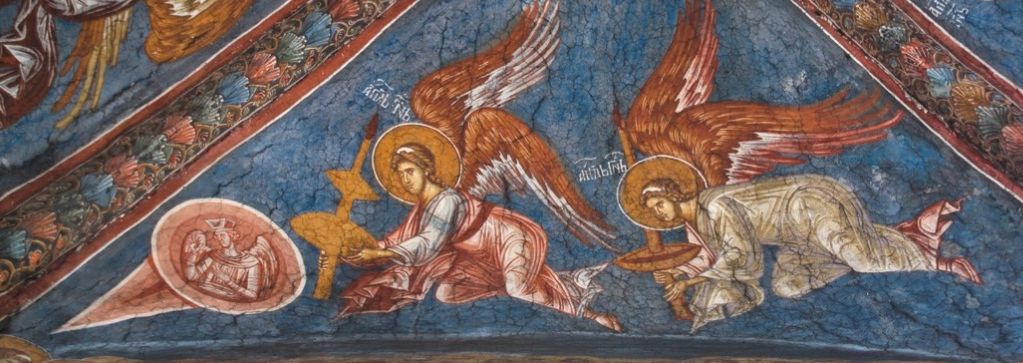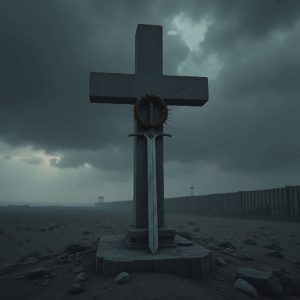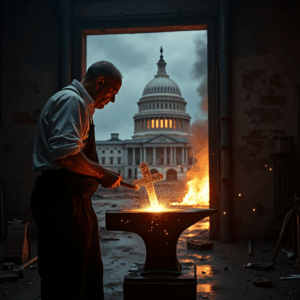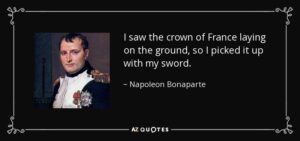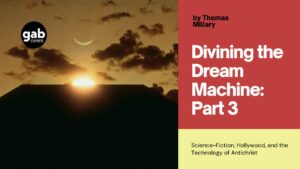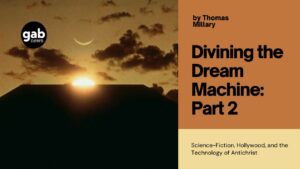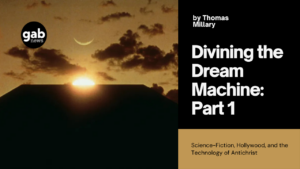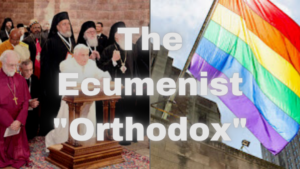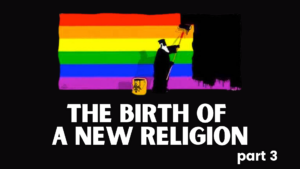Among the many things we desire, an important one is a “place to belong.” With the fragmentation of the extended family, and so much else, a growing number of people are becoming acutely aware that they do not “belong” anywhere. Our highly franchised suburban world often has the strange effect that places separated by miles (even states), all look the same, have the same stores, the same restaurants, and an overall sameness that only accentuates the sense of alienation in that it “looks the same” but is “not ours.”
I recall the first Christmas my family moved from Durham, NC to Oak Ridge, TN. My wife and I were Christmas shopping in the local Toys ‘R Us. We walked in the door with our list, and my wife directed me towards a particular aisle. I said, “How can you know where that toy is? We’ve never been in this store before.” She replied, “It’s the same as the one in Durham.” It was at that moment that I realized that moving 400 miles meant nothing. America is a franchise operation – everywhere you go, there you are. It works out to be the same as being nowhere.
The simple fact is that human beings innately need a place to belong, even though it is expressed in a vast range of ways. Its absence is one of the many factors that are making us increasingly sick (soul-sick). The Tradition of the Church is not silent in this matter.
The late 5th-century writer of the Dionysian corpus coined the term “hierarchy” in his writings. Archbishop Alexander Golitzin notes that the word did not exist in writings that preceded Dionysius, “But then he coins it, and it’s everywhere!”1 In modern speech, hierarchy is a “vertical” term, describing a system of increasing authority. In Dionysius, it has a larger and broader meaning, describing the sense of “holy order” (which reflects the actual Greek). Indeed, according to Vladika Alexander, the term is pretty much synonymous with “liturgy” itself. The Liturgy has movement, and actions, of bishops, priests, deacons, people, choir, readers, etc. All of them, in the reckoning of Dionysius, are ordered in a manner that reflects a heavenly order. It is Dionysius who first describes the nine “ranks” of angels. There is a very deep and discerning observation within the thought of Dionysius. Not only do human beings desire a “place,” the whole created universe desires a place – and the right place.
We long for a place to belong.
Dionysius (and later St. Maximus and others) pondered the meaning of the ordered universe reflected in the Liturgy. The ordering for him, was an understanding of the lower’s desire for the higher, and the higher’s love towards the lower. This vision is reflected in how the liturgy describes itself to us. As the priest and deacon bring the Holy Gifts out of the sanctuary (in order to bring them in again to the altar), the choir sings, “Let us who mystically represent the Cherubim, and who sing the thrice holy hymn, now lay aside all earthly cares…” There are other mentions of the angels in many of the silent prayers whispered by the priest. Quite prominently are the angels described by Isaiah in his vision of heaven. Surrounding the throne of God they ceaselessly cry, “Holy, Holy, Holy, Lord God of Hosts! Heaven and earth are full of Your glory…” Thus, when we sing that hymn we specifically describe ourselves as having entered into that self-same heavenly Liturgy. That which is there, is now present here.
This would all be but a fanciful description of a Church service were it not for the fact that the whole of the universe and our lives as well are seen and best described as a Liturgy. The counter-clockwise movements of the priest and altar party (going out the North Door and entering through the South) reflect the counter-clockwise movement of the earth itself (if looked at from the North axis). It is the path traced by the stars through the heavens (at least in an earth-centric description). As the earth orbits the Sun, so all things move around God. We follow the dance of the angels. That same dance is wonderfully repeated at weddings and ordinations. There, the same path is traced as we sing, “Rejoice, O Isaiah!”
The writings of Dionysius became extremely popular in both the East and the West. To some extent, the structures of medieval society and its feudalism were a deeply flawed attempt to structure society in accordance with this vision. It is deeply flawed for the simple reason that structures cut both ways – either as oppressors or as liberators. Romantic tales of the medieval world often portray a false idealization, whereas its corruption and oppression had as much to do with its end as anything else that can be traced. The Reformation and its unintended consequences were, at the very least, a response to the evils and failings of the medieval synthesis.
The problem with all that, I think, is one of the baby and the bathwater. Democratic idealism and radical individualism were extremely effective in deconstructing what went before. They had no vision, however, for a world with “place.” It is easy to destroy a structure. It is an absolute work of grace to put something salutary in its place. In large part, modernity has defaulted to an “every man for himself” model of place – something which has failed to prevent oppressive structures of a modern cast.
Despite all of our modern protests, the need for an appropriate and life-giving structure has not disappeared. There is no better name for this need than “hierarchy.” It is a divine or holy order that our hearts require. A great difficulty with this “order” is that it is better described as a dance than as a rigid building or framework. It is a movement in which there is freedom – point and counterpoint – giving and receiving – action and response. In truth, hierarchy (as envisioned and described by Dionysius) is love.
Marriage is an apt image for hierarchy – perhaps the first hierarchy ever given to human beings. We can abuse the notion that “man is the head of woman.” We fail (in our translations) to see St. Paul’s wordplay in that expression. Man is “head” because he is “source” (in the Adam story – Eve is taken from his side). He is not “head” as in “boss.” In Hebrew, head is “rosh,” as in the “source” or “beginning.” Thus Rosh Hashannah is the “head of the year,” it’s beginning or source. This is the background of St. Paul’s wordplay. He was not musing about some misogynist bureaucracy.
Think of parents. They are the source of their children. In dysfunctional families, parents may imagine themselves to be lords and masters of their children. More properly, when all is well, they nurture their children as the very bones of their bones, flesh of their flesh, heart of their heart. Good parents sacrifice themselves for their children. That is the nature of love.
We long for a place to belong. I want relationships of sacrifice. I want to love with abandonment and be loved in return.
We live in a desiccated society where the medieval synthesis long ago perished, now replaced by incompetent servants of wealth and power and the diseased madness of political philosophies hatched from the brains of broken little men.
We were created to dance with God and the angels, to move in circles of meaning that renew and return us to the place we belong. There is a Liturgy in which all are, even now, participating. Angels and archangels, guardians, and the whole synaxis watch over us, invisibly maintaining the structures of the universe and keeping open the paths that direct us to our place and the homeland of paradise.
The Cross marks the way – for them – for us – for every created thing. Blessed be God!
Footnotes
- An interesting lecture by Archbishop Alexander on Dionysius can be found in this Youtube video. He specifically addresses the notion of hierarchy.
This article is republished, with permission from the author, from here.

Fr. Stephen is a priest of the Orthodox Church in America, Pastor Emeritus of St. Anne Orthodox Church in Oak Ridge, Tennessee. He is also author of Everywhere Present and the Glory to God podcast series.

